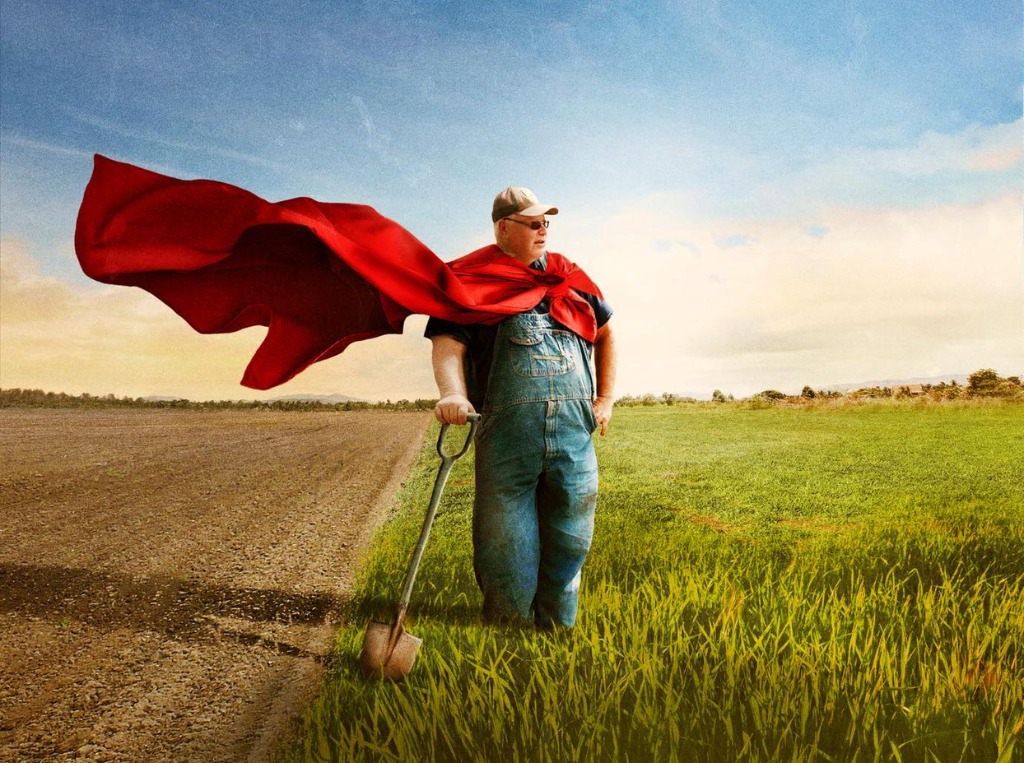8 Mins Read
Netflix’s recent Poisoned: The Dirty Truth About Your Food documentary made waves across the Internet and media for its detailed exposé of the US food system’s fallacies. Where do we go from there? A whole host of upcoming documentaries are taking a closer look at our food systems and the future of food (and the planet) – here are six that you just can’t miss.
As much as food makes me happy and blissful, most food documentaries just make me uncomfortable. And for good reason – many of these tackle the deep-rooted issues in our global food system and can make for a disheartening, if compelling, watch.
Don’t get me wrong: features about cooking (like Salt, Fat, Acid, Heat or Chef’s Table) are wonderful and uplifting, but those that look at where our food comes from, and how we’ll eat in the future can be as enlightening as they can be upsetting.
Netflix’s Poisoned certainly falls in the latter category – exposing how fatal foodborne illnesses are tied to the way food is grown, transported and packaged in the US. It’s shocking stuff, but equally important.
If it didn’t – for lack of a better phrase – whet your appetite, fret not. Here are six upcoming documentaries exploring the future of our food system.
Food, Inc. 2
Release date: TBD
A follow-up to the Oscar-nominated 2008 feature Food, Inc., which examined how Big Food impacted Americans’ food chain and eating habits, Food, Inc. 2 is described as “a continuation of the original story”. Helmed by Robert Kenner – who directed the original documentary – and Melissa Robledo (a co-producer on the first film), the sequel’s tagline reads: ‘Back for Seconds’.
It premiered at the Telluride Film Festival on September 1 and is slated for release later this year. “All of us swore we would never go to this area again,” Kenner was quoted as saying by Deadline. “But I think on some levels, this became such an important story to go tell that we all felt we needed to come back and we could talk about it in sort of stronger terms than we did [before].”
The Covid-19 pandemic became the key impetus for Food, Inc. 2 when meatpacking plants became hotbeds of the virus. Additionally, the documentary looks at the rise of ultra-processed foods, which is linked to higher obesity and diabetes rates in the US.
The film food experts like Eric Schlosser, who authored the acclaimed book and accompanying film Fast Food Nation, and writer and journalist Michael Pollan, who consulted on the original film too (you’ll know him from the documentaries Cooked and How to Change Your Mind).
Food, Inc. 2 has received mixed reviews from critics at the Telluride premiere. “‘Food, Inc. 2’ has some vital if very familiar things to say about the crisis state of the American food system, but it’s a far less sure-footed and authoritative documentary than ‘Food, Inc.’ was,” writes Variety, which calls it a disappointing sequel. “And it carries almost none of the earlier film’s revelatory charge.”
On the flip side, The Hollywood Reporter‘s Sheri Linden praised the “nice balance between eager curiosity and the-jury’s-still-out skepticism” about food tech innovations like cultivated meat, bee-free honey and beanless coffee. “Food, Inc. 2 addresses issues of the utmost urgency, key among them unchecked business consolidation, the hegemony of multinational corporations, and an aggressive indifference to what’s healthful and sustainable for people, animals and the planet,” she writes.
Feeding Tomorrow
Release date: January 23, 2024
A winner of the 2022 Best Environmental Documentary award at the Los Angeles Documentary Film Festival, Feeding Tomorrow is a film that champions regenerative agriculture and its potential to transform our food system.
It looks at food through the lens of food leaders across the supply chain, including farmers, educators, entrepreneurs, scientists, nutritionists and wellness experts. Feeding Tomorrow aims to highlight how food affects every part of life, and explores “the biggest challenges and the real solutions we face in agriculture, healthcare and education”.
The film presents actions individuals can take in their daily lives to be “part of the change” and build a more regenerative food system for local communities in the face of climate change, health epidemics and food insecurity. It provides its solutions using a three-pronged approach: “farming that will feed our future, healthy food that will heal us, and a new model for holistic education”.
Feeding Tomorrow is directed by Oliver English, a chef-filmmaker, and co-founder and CEO of Common Table Creative, an impact-driven production company. The food documentary is premiering at the ongoing 2023 Woodstock Film Festival. In an interview with Inside+Out Upstate NY, English called it a “powerful and hopeful documentary about the future of food”, adding that while the focus is on regenerative farming, the film is also about “systems change”.
Common Ground
Release date: September 27, 2023 onwards
A sequel to 2020’s Kiss The Ground, Common Ground features a powerhouse of Hollywood celebrities all extolling the virtues of regenerative farming. The original documentary
“If the soil dies, we die.” That’s the message of Common Ground, a sequel to 2020’s Kiss The Ground, which examined how industrial agriculture and chemical use has rid soil of its nutrients, and extolled the virtues of regenerative farming, a “new, old approach”.
Like the original, which was narrated by Woody Harrelson, Common Ground features a powerhouse of Hollywood celebrities, including Laura Dern, Rosario Dawson, Donald Glover, Jason Momoa, Ian Somerhalder and Harrelson (who all take turns narrating the film). The film, helmed by Kiss The Ground directors Josh and Rebecca Tickell, aims to “rally the transition of 100 million acres of US land to regenerative by tripling the reach and impact of our first film”.
It has already appeared at numerous film festivals and won the Human/Nature Award at the Tribeca Film Festival. It’s currently premiering across the US in select theatres. “Nature is the mother of all, and if Mama ain’t happy, we’re fucked,” says Momoa in the trailer.
It has opened to largely positive reviews. For example, Matt Zoller Seitz of RogerEbert.com calls it “a position paper with panache”. “The film’s most fascinating parts contextualize industrial farming methods within the larger story of North America’s colonization by Europeans, who displaced Native Americans whose philosophy stressed harmony with nature, and imported other human beings – African slaves –as unpaid supervisors of rice, cotton, and sugar plantations that owners lacked the skills to run on their own,” he wrote.
However, in a more nuanced take on The Wrap, Martin Tsai calls it an “environmental documentary that misses the point”. “Even if you agree with the film’s political lean, it’s hard to overlook the unorthodoxy. “Common Ground” smacks of propaganda masquerading as documentary,” he writes. “If such can qualify as documentary, then so should reality TV.”
Hope in the Water
Release date: TBD (2024)

A docuseries rather than a one-off documentary, Hope in the Water takes a closer look at how we can restore the world’s oceans while producing food responsibly. Produced by marine food non-profit Fed by Blue, it takes an investigative journalism approach to highlight first-person stories of people affected by water shortages, stressed aquatic resources and related food insecurity.
The film explores themes of sustainability, biodiversity, conservation, revitalisation, equity, profit, and Indigenous culture and innovation, and hopes to find solutions to preserve what the filmmakers call ‘blue food’. It is executive-produced by chef and restauranteur Andrew Zimmern and renowned TV writer and producer David E Kelley.
“I have been working on aquaculture and social justice issues around food for 12 and 24 years, respectably,” Zimmern told Utah-based local news outlet TownLift. “The intersection of our climate crisis, our food pathways, our immigration issues, our national security, our international standing, and global economic developments all intersect. And the place that we are taking the least advantage of the most possible solution is how we relate to food that can be grown in our waters, be they fresh or salt water, and how that food is distributed.”
Food 2050
Release date: TBD (2023)
An evolution of the 10-part mini-docuseries Food 2050, which was co-produced by The Rockefeller Foundation and spotlights 10 leaders looking to improve the food system “from the ground up”.
While the details of the 1h 20m documentary are under wraps, the film’s website explains: “As our profit-driven food systems crumble and our planet rapidly becomes unlivable, a group of global visionaries – activists, farmers, doctors, and scientists – lead extraordinary efforts to ensure a healthy, equitable, and sustainable food future.”
It’s a look at where our food system will be in 2050, by when we’ll have 10 billion people on the planet and need dramatic changes to production and consumption in order to meet demand. “Current food production systems and the diets they deliver are the #1 cause of preventable death. The #1 cause of greenhouse gas emissions. And use 70% of fresh water, amidst droughts and water scarcity increasing globally,” notes the Food 2050 series website.
The documentary is directed by Matthew Thompson, who also helmed the series. The series premiered online in 2021 and in the form of a feature film at last year’s COP27.
The Future of Food
Release date: December 2023
Speaking of climate summits, this year’s COP28 will see the premiere of The Future of Food, which is fitting considering it has been described as a food-forward summit and will be serving plant-based food for the most part.
Co-produced by the World Farmers’ Organisation, The Future of Food is another docuseries highlighting the climate-change-induced challenges faced by the world’s agriculture system. The series will spotlight farmers’ stories and explore innovations, developments and local solutions being implemented by the farming sector to overcome these environmental stresses.
The documentary will outline the importance of sustainable agriculture and transitioning towards more “climate-resilient and nature-positive farming practices”, which the filmmakers describe would be beneficial for “farmers, their families, the consumers and the planet”.
“Our aim with this series is to lift a curtain and peer behind the scenes of farming today and understand how we can all contribute to a future in which farming is more and more sustainable and could hold the keys to a future that is fair, equal and respectful for the planet and for us all,” explained executive producer Elizabeth Fisher-Robins.
The documentarians say The Future of Food aims to inspire youngsters to broaden agricultural horizons, build bridges between farmers internationally, and help people understand the importance of farmers and agriculture – from “ending hunger to protecting nature and biodiversity, overcoming poverty, and fighting against climate change”.
“We learn how the tradition of farming has become a vital ingredient in our fight for survival, how those that feed us have adapted and prospered despite the challenges,” said Jack Davies, creative director at co-producer Zinc Media Group. “With personal, emotive stories, we will look deep into new technology, new thinking, a new understanding of the world we live in.”




